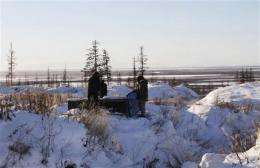UN: Emission pledges fall short of climate target

(AP) -- Emissions cuts pledged by countries in a nonbinding climate accord last year fall short of what's needed to avoid the worst consequences of global warming, the U.N.'s environment agency said Tuesday.
The sobering report by the U.N. Environmental Program comes as climate negotiators prepare for another round of talks next week in Cancun, Mexico.
Even if the voluntary pledges made last year in the so-called Copenhagen Accord are fully met, that will only achieve 60 percent of the emissions cuts required to keep temperatures from rising less than 2 degrees C (3.6 F) above preindustrial levels and head off the worst effects of global warming, the UNEP said.
However, UNEP Executive Director Achim Steiner called those pledges "a good first step," and that the gap can be reduced further with steeper emissions cuts.
"There is a gap between the science and current ambition levels," Steiner said in a statement. "But, what this report shows is that the options on the table right now in the negotiations can get us almost 60 per cent of the way there."
The failure of the annual U.N. conference to produce a climate agreement last year in Copenhagen, Denmark, has raised doubts about whether the long-running, 194-nation talks can ever agree on a legally binding treaty for reining in global warming.
The core shortcoming has been in finding a consensus formula for mandatory reductions in countries' emissions of carbon dioxide and other global warming gases. A dispute between the United States and China has stymied progress on this central element of any global climate deal.
Negotiators are not expected to solve that standoff in Cancun. Instead, delegates will focus on climate financial aid, deforestation and other secondary issues to try to revive momentum toward an umbrella deal at next year's conference in South Africa or at the Rio de Janeiro Earth Summit in 2012.
Eighty-five of the 140 countries that have associated themselves with the Copenhagen Accord have pledged to cut emissions or rein in their growth by 2020, the report said.
UNEP found that if those pledges are fully met, global emissions levels would reach about 49 gigatons of carbon dioxide equivalent by 2020. That's still 5 gigatons too high to have a chance to limit global warming to 2 degrees C this century.
If none of the pledges made in Copenhagen are fulfilled, emissions would reach 56 gigatons, said the report, which Steiner said was meant to remind countries of how far the Copenhagen decisions would take them.
"But (it's) also to point out that there is still a challenge that the world would have to address even if all of what was promised to each other in Copenhagen was implemented," he told reporters during the launch of the report in Helsinki.
"So the message to Cancun is, Copenhagen did not yield a legally binding outcome but Copenhagen has within the accord a series of pledges that are meaningful and potentially far-reaching," he added.
U.N. Secretary-General Ban Ki-moon called on countries to make good on their pledges and to further the negotiations in Cancun.
"There is no time to waste," Ban said in a statement. "By closing the gap between the science and current ambition levels, we can seize the opportunity to usher in a new era of low-carbon prosperity and sustainable development for all."
The takeover of the U.S. House of Representatives by Republicans, many of whom dismiss strong scientific evidence of human-caused warming, all but rules out U.S. action for at least two years.
Cancun negotiators hope at least for agreement on a "green fund" to disburse aid that developed countries promised at Copenhagen - $100 billion a year by 2020 - for developing countries to adapt to a changing climate by building seawalls, shifting farming patterns, and installing clean energy sources.
The developing world hopes, too, for better terms for transferring patented green technology from richer nations. In a third area, delegates aim to make progress on the complex issue of compensating poorer nations for protecting their forests, key to the planet's ability to absorb carbon dioxide.
©2010 The Associated Press. All rights reserved. This material may not be published, broadcast, rewritten or redistributed.


















